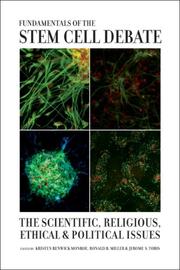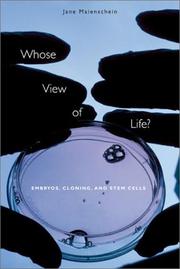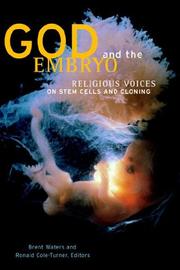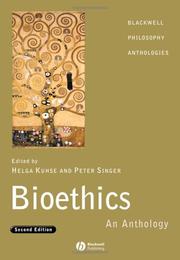| Listing 1 - 10 of 13 | << page >> |
Sort by
|

ISBN: 9780300122923 9780300143232 Year: 2007 Publisher: New Haven, Conn. Yale University Press
Abstract | Keywords | Export | Availability | Bookmark
 Loading...
Loading...Choose an application
- Reference Manager
- EndNote
- RefWorks (Direct export to RefWorks)
The explosion of interest in stem cell research raises a raft of controversial policy questions. When should human embryos be used to create stem cells? Should cloning be outlawed? Should egg and tissue donors be paid? Should we allow stem cells to be patented? Is the government entitled to a portion of the revenue from stem cell technology created with public funds? How should the FDA and the courts balance access to revolutionary treatments with protection of the public against unknown risks? In this book, Russell Korobkin and Stephen Munzer provide the first thorough discussion and analysis of these and other unsettled legal and policy issues surrounding stem cell science. Their clear and concise description of complex problems coupled with logical and well-balanced policy conclusions makes this volume essential reading for scholars and general readers concerned with the success of stem cell research and the future of regenerative medicine.
Medical law --- Professional ethics. Deontology --- United States --- stamcelonderzoek --- recherche sur des cellules souches --- Stem cells --- Tissue engineering --- Research --- Law and legislation --- Biomedical engineering --- Regenerative medicine --- Tissue culture --- Colony-forming units (Cells) --- Mother cells --- Progenitor cells --- Cells --- United States of America

ISBN: 9780520252127 9780520252103 0520252101 0520252128 Year: 2008 Publisher: Berkeley (Calif.) University of California Press
Abstract | Keywords | Export | Availability | Bookmark
 Loading...
Loading...Choose an application
- Reference Manager
- EndNote
- RefWorks (Direct export to RefWorks)
Few recent advances in science have generated as much excitement and controversy as the use of human embryonic stem cells. The potential of these cells to replace diseased or damaged cells in virtually every type of tissue of the body heralds the advent of an extraordinary new field of medicine. Controversy arises, however, because current techniques required to harvest stem cells involve the destruction of the human blastocysts. This evenhanded, lucidly written volume is an essential tool for understanding the complex issues - scientific, religious, ethical, and political - that currently fuel public debate about stem cell research. One of the few books to provide a comprehensive overview for a wide audience, the volume brings together leading scientists, ethicists, political scientists, and doctors to explain this new scientific development and explore its ramifications.
embryonale stamcel (menselijke embryonale stamcel, totipotent, pluripotent) --- stamcelonderzoek --- ethiek (ethische aspecten) --- cellule souche embryonnaire (cellule souche embryonnaire humaine) --- recherche sur des cellules souches --- ethique (aspects ethiques) --- Embryonic stem cells --- Embryonic Stem Cells --- Biomedical Research --- Human Experimentation --- Public Policy --- Research --- Moral and ethical aspects --- Political aspects --- Religious aspects. --- ethics --- Public policy --- Ethics --- Religious aspects --- Embryonal stem cells --- Stem cells --- Research&delete&
Book
ISBN: 2880113814 9782880113810 Year: 2006 Publisher: Saint-Maurice: Saint-Augustin,
Abstract | Keywords | Export | Availability | Bookmark
 Loading...
Loading...Choose an application
- Reference Manager
- EndNote
- RefWorks (Direct export to RefWorks)
Dans une démocratie moderne, tous les débats ne se jouent pas dans un même registre, car certaines questions engagent le sens ultime des valeurs démocratiques et mettent en jeu les fondements de la culture : recherche sur l'embryon humain, avortement, euthanasie, aide au suicide, droits de l'enfant. Alors que le débat oscille sans cesse entre la haute technicité et la vulgarisation émotionnelle, ce livre se situe entre deux : il fait appel à des spécialistes qui en expliquent les enjeux de manière claire, en évitant les nouveaux dogmatismes de la pensée unique. Encadré d'une préface du Conseiller fédéral Pascal Couchepin et d'une postface du Cardinal Georges Cottier, il éclaire aussi la difficile question de la place des Eglises dans le débat démocratique, et interroge le rôle des médias. Contribution actuelle au débat démocratique, ce livre grand public présente une véritable ambition culturelle : celle-ci est due à son objet, puisqu'il s'agit du sens de l'homme.
Medical ethics --- Bioethics --- embryostatuut (moreel statuut van het embryo, juridisch statuut van het embryo, potentiële persoon) --- stamcelonderzoek --- Zwitserland --- Biomedical ethics --- Clinical ethics --- Ethics, Medical --- Health care ethics --- Medical care --- Medicine --- Professional ethics --- Nursing ethics --- Social medicine --- Biology --- Life sciences --- Life sciences ethics --- Science --- statut de l'embryon (statut moral de l'embryon, statut juridique de l'embryon, personne potentielle) --- recherche sur des cellules souches --- Suisse --- Moral and ethical aspects --- Medical ethics - Switzerland --- Bioethics - Switzerland

ISBN: 0674040430 9780674040434 9780674011700 0674011708 0674011708 Year: 2003 Publisher: Cambridge, Mass. : Harvard University Press,
Abstract | Keywords | Export | Availability | Bookmark
 Loading...
Loading...Choose an application
- Reference Manager
- EndNote
- RefWorks (Direct export to RefWorks)
Jane Maienschein brings current debates in the field of human embryo research into sharp focus by examining developments in stem cell research, cloning and embryology in historical and philosophical context and by exploring legal, social and ethical issues at the heart of what has become a political controversy.
Human embryo --- Stem cells --- Human cloning --- Human beings --- Cloning --- Human reproductive technology --- Colony-forming units (Cells) --- Mother cells --- Progenitor cells --- Cells --- Embryo, Human --- Embryology, Human --- Research --- Political aspects --- embryologie --- embryo-onderzoek (experiment op embryo's, onderzoek op embryo's in vitro) --- genetica (genen) --- kloneren (klonen, therapeutisch kloneren, reproductief kloneren) --- stamcelonderzoek --- recherche sur l'embryon (expérimentation sur l'embryon, recherche sur les embryons in vitro) --- génétique (gènes) --- clonage (clonage thérapeutique, clonage reproductif) --- recherche sur des cellules souches
Book
ISBN: 9085710367 9789085710363 Year: 2006 Publisher: Diemen Veen Magazines
Abstract | Keywords | Export | Availability | Bookmark
 Loading...
Loading...Choose an application
- Reference Manager
- EndNote
- RefWorks (Direct export to RefWorks)
Stamcellen zijn ongedifferentieerde cellen, oftewel cellen die nog geen specifieke functie hebben. Ze kunnen bijvoorbeeld uit navelstrengbloed worden gehaald. Wetenschappers zoeken methoden om deze cellen in te zetten bij het repareren van schade aan organen. De ontwikkelingen rond stamcellen wekken hoge - soms al te hoge - verwachtingen, bijvoorbeeld bij de strijd tegen Parkinson, verschillende vormen van suikerziekte en hartinfarcten. Toch zijn er nog grote hindernissen te nemen. Nog lang niet alles is bekend over de manier waarop stamcellen hun functie krijgen (en dus overgaan tot gewonen lichaamscellen). Ook loopt men bij therapeutische toepassingen nog aan tegen afstotingsverschijnselen. Dit boek gaat uitgebreid in op de mogelijkheden en beperkingen van het toepassen van stamcellen.
stamceltransplantatie --- Human genetics --- Clinical chemistry --- embryologie (geneeskunde) --- Human medicine --- Stamcelonderzoek --- 575 --- 577.21 --- 001 wetenschap --- 57 biologie --- 573.2 --- biologie --- embryodonatie --- embryologie --- hartfalen --- klonen --- navelstrengbloed --- stamcellen --- 57 --- 576.4 --- Cytologie (celleer) --- Stamcellen --- Stamceltransplantatie --- Cytologie --- 576.3 --- Celbiologie --- 577.21 Molecular mechanism of coding, storage and realization of inheritance information. Molecular genetics. Molecular biology of the gene --- Molecular mechanism of coding, storage and realization of inheritance information. Molecular genetics. Molecular biology of the gene --- 575 General genetics. General cytogenetics. Immunogenetics. Evolution. Speciation. Phylogeny --- General genetics. General cytogenetics. Immunogenetics. Evolution. Speciation. Phylogeny --- Cel- en weefselleer --- Stamcel --- Embryologie --- Geneeskunde --- stamcel --- Parkinson-zizkte --- Provincie West-Vlaanderen --- Parkinson-ziekte --- Beroep --- Hulpverlening --- Verpleegkunde

ISBN: 087840998X Year: 2003 Publisher: Washington, D.C. Georgetown University Press
Abstract | Keywords | Export | Availability | Bookmark
 Loading...
Loading...Choose an application
- Reference Manager
- EndNote
- RefWorks (Direct export to RefWorks)
Discussions and debates over the medical use of stem cells and cloning have always had a religious component. But there are many different religious voices. Contributors reflect the spectrum of Christian responses, from liberal Protestant to evangelical to Roman Catholic as well as Jewish perspectives. In addition to the deliberations found here, God and the Embryo includes a series of official statements on the issues from religious bodies. "Human Cloning and Human Dignity: An Ethical Inquiry," from the statement of the President's Council on Bioethics, concludes the book. The disputations will continue, but for anyone interested in the nuances of and religious perspectives that make their important contributions to these ethically challenging and important dialectics, God and the Embryo is an invaluable resource.
Medical law --- Christian moral theology --- Professional ethics. Deontology --- #GBIB:CBMER --- stamcelonderzoek --- embryonale stamcel (menselijke embryonale stamcel, totipotent, pluripotent) --- embryo-onderzoek (experiment op embryo's, onderzoek op embryo's in vitro) --- embryostatuut (moreel statuut van het embryo, juridisch statuut van het embryo, potentiële persoon) --- godsdienst (religie, religieuze aspecten) --- recherche sur des cellules souches --- cellule souche embryonnaire (cellule souche embryonnaire humaine) --- recherche sur l'embryon (expérimentation sur l'embryon, recherche sur les embryons in vitro) --- statut de l'embryon (statut moral de l'embryon, statut juridique de l'embryon, personne potentielle) --- religion (aspects religieux) --- Embryonic stem cells --- Human cloning --- Research --- Religious aspects. --- Embryonal stem cells --- Stem cells --- Research&delete& --- Religious aspects
Book

ISBN: 9782874550744 2874550744 Year: 2007 Publisher: Louvain-la-Neuve : Anthemis,
Abstract | Keywords | Export | Availability | Bookmark
 Loading...
Loading...Choose an application
- Reference Manager
- EndNote
- RefWorks (Direct export to RefWorks)
Le point sur les questions scientifiques, éthiques et juridiques que posent les cellules souches... L'impact du développement de ces techniques sur la santé des femmes Quel est l’impact de la recherche dans le domaine des cellules souches sur la santé et le vécu des femmes ? La médecine est-elle la même pour les hommes et pour les femmes ? Les cellules souches sont-elles brevetables ? Des spécialistes en la matière ont examiné ces différentes questions à l’occasion d’un symposium organisé par la Medical Women’s Association of Belgium. Au travers des contributions reproduites dans le présent ouvrage, ces médecins, juristes et professeurs nous présentent les différentes catégories de cellules souches, exposent leurs spécificités biologiques et les bénéfices que les praticiens et leurs patients peuvent en attendre. Cet ouvrage dresse un état des lieux des derniers progrès et des perspectives qu’offrent ces techniques, en particulier à l’égard des femmes. Welke invloed heeft stamcelonderzoek op de gezondheid en het leven van vrouwen? Heeft geneeskunde dezelfde impact op mannen als op vrouwen? Kan men een patent krijgen op stamcellen? Een symposium georganiseerd door de Medical Women’s Association of Belgium was voor enkele specialisten ter zake een uitgelezen moment om deze vragen uit te diepen. De uiteenzettingen van de sprekers - artsen, juristen en professoren - werden gebundeld in dit werk. In hun bijdrage geven ze een verrassend heldere toelichting over de verschillende soorten stamcellen, hun biologische eigenschappen, alsook de voordelen die stamcellen bieden voor artsen en patiënten. Dit werk geeft een stand van zaken van de laatste ontwikkelingen in dit domein en van de mogelijkheden die deze techniek creëert, in het bijzonder voor vrouwen.
Medical law --- Hygiene. Public health. Protection --- Clinical chemistry --- Medical laws and legislation --- Embryonic stem cells --- Stem cells --- Women --- Human reproductive technology --- Médecine --- Cellules souches embryonnaires --- Cellules souches --- Femmes --- Procréation médicalement assistée --- Congresses --- Research --- Moral and ethical aspects --- Law and legislation --- Health and hygiene --- Droit --- Congrès --- Recherche --- Aspect moral --- Santé et hygiène --- stamcelonderzoek --- vrouwen --- gezondheid --- recherche sur des cellules souches --- femmes --- santé --- Conferences - Meetings --- Médecine --- Procréation médicalement assistée --- Congrès --- Santé et hygiène --- Congresses. --- Droit médical --- DROIT DE LA SANTE --- Bioéthique --- Cellules souches humaines --- Ovules --- BELGIQUE --- recherche scientifique --- brevets d'invention --- don --- consentement éclairé --- Ethics --- Health --- Psychology --- Law --- Reproductive technology --- Book --- Egg cell donor
Book
ISBN: 9789089771339 9089771336 Year: 2010 Volume: 3 Publisher: Heule: UGA,
Abstract | Keywords | Export | Availability | Bookmark
 Loading...
Loading...Choose an application
- Reference Manager
- EndNote
- RefWorks (Direct export to RefWorks)
1. Stamcellen - 2.Noodzaak aan reglementering - 3. Historiek bij de wet 19 december 008 - 4. RL 2004/23/EG van 31 maart 2004 - 5. Privé- of publieke navelstrengbloedbanken, autoloog of allogeen gebruik van stamcellen - 6. Omzetting richtiljn 2004/23/EG - 7. Overzicht van de wet van 19 december 2008 - 8. Artikelsgewijze toelichting - 9. Slotbepalingen Het gebruik van menselijke weefsels, (stam)cellen en ander lichaamsmateriaal is een sterk groeiende sector van de geneeskunde, waarin grote kansen voor de behandeling van tot dusverre ongeneeslijke ziekten liggen. De kwaliteit en veiligheid van deze stoffen moeten gewaarborgd zijn, met name om de overdracht van ziekten te voorkomen. Om de volksgezondheid te beschermen en de overdracht van infectieziekten door deze weefsels en cellen te vermijden, moeten bij het doneren, verkrijgen, testen, bewerken, bewaren, distribueren en gebruiken van alle veiligheidsmaatregelen worden genomen. De wet van 19 december 2008 inzake het verkrijgen en het gebruik van menselijk lichaamsmateriaal met het oog op de geneeskundige toepassing op de mens of het wetenschappelijk onderzoek, behelst meer dan een omzetting van een Europese Richtlijn. De problematiek van de stamcellen komt ter sprake, alsook deze van de 'navelstrengbloedbanken' en het evenwicht tussen privé- en publiek initiatief in deze sector. Verder heeft de wetgever een werkbaar kader geschetst voor wetenschappelijk onderzoek ter zake.
Medical law --- Professional ethics. Deontology --- Belgium --- Medical laws and legislation --- Bioethics --- Human experimentation in medicine --- Médecine --- Bioéthique --- Expérimentation humaine en médecine --- Law and legislation --- Droit --- 601.7 --- medische ethiek (gez) --- stamcelonderzoek --- Wet van 19 december 2008 inzake het verkrijgen en het gebruik van menselijk lichaamsmateriaal met het oog op de geneeskundige toepassing op de mens of het wetenschappelijk onderzoek --- biobank (bank voor menselijk lichaamsmateriaal) --- stamcel (volwassen stamcel, foetale stamcel, embryonale stamcel, germinale stamcel, somatische stamcel, hematopoïetische stamcel) --- Gezondheidsrecht --- Stamcellen --- Loi du19 décembre 2008 relative à l'obtention et à l'utilisation de matériel corporel humain destiné à des applications médicales humaines ou à des fins de recherche scientifique --- biobanque (banque de matériel corporel humain) --- cellule souche (cellule souche adulte, cellule souche foetale, cellule souche embryonnaire, cellule souche germinale, cellule souche somatique, cellule souche hématopoïétique) --- Médecine --- Bioéthique --- Expérimentation humaine en médecine --- Provincie West-Vlaanderen --- Droit médical --- Belgique
Book
ISBN: 9013005330 9789013005332 Year: 2004 Publisher: Deventer: Kluwer,
Abstract | Keywords | Export | Availability | Bookmark
 Loading...
Loading...Choose an application
- Reference Manager
- EndNote
- RefWorks (Direct export to RefWorks)
De medische en technische ontwikkelingen betreffende beginnend leven in de afgelopen decennia mogen revolutionair genoemd worden. De grenzen van het mogelijke lijken nog niet te zijn bereikt. De samenleving ziet zich gesteld voor nieuwe vragen die vanuit verschillende invalshoeken, zoals de medische, de filosofische, de theologische, de ethische en de juridische, beantwoording behoeven. Het gaat om vragen die de fundamenten van het menselijk bestaan raken. Naast een inleiding bevat dit boek zes bijdragen over de juridische en ethische aspecten van de zogenoemde wrongful birth- en wrongful life-acties. De Nederlandse juridische bijdragen laten ook zien hoe elders in Europa over deze problematiek wordt gedacht. In het tweede deel van dit boek is een aantal bijdragen opgenomen die zijn gericht op nieuw menselijk leven. De nadruk ligt daarbij op de medische en medisch-ethische aspecten.
Biologie humaine -- Morale et aspects éthiques --- Biomedical ethics --- Biomedische ethiek --- Biomédecine -- Morale et aspects éthiques --- Deontologie [Medische ] --- Deontology [Medical ] --- Déontologie médicale --- Ethics [Medical ] --- Ethiek [Medische ] --- Ethique médicale --- Medical care -- Moral and ethical aspects --- Medical deontology --- Medical ethics --- Medicine -- Moral and ethical aspects --- Medische deontologie --- Medische ethiek --- Morale et médecine --- Morale médicale --- Médecine -- Innovations -- Morale et aspects éthiques --- Médecine -- Morale et aspects éthiques --- Médecine et morale --- Politique sanitaire -- Morale et aspects éthiques --- Soins médicaux -- Morale et aspects éthiques --- Éthique clinique --- 17.022 --- #GBIB:CBMER --- 13.01.ZZD --- prenatale diagnostiek (prenatale test) --- stamcelonderzoek --- neonatale intensieve zorg --- Zedelijke beoordeling. Axiologie. Ethisch oordelen --- Wettelijke en contractuele aansprakelijkheid ; Algemeen ; Meerdere landen --- diagnostic prénatal (test prénatal, DPN) --- soins néonataux intensifs --- 17.022 Zedelijke beoordeling. Axiologie. Ethisch oordelen --- Abortion --- Moral and ethical aspects --- Law and legislation --- Professional ethics. Deontology --- Ethics of family. Ethics of sexuality --- Medical law

ISBN: 1405129484 9781405129480 1405129476 9781405129473 Year: 2005 Volume: 9 Publisher: Malden: Blackwell,
Abstract | Keywords | Export | Availability | Bookmark
 Loading...
Loading...Choose an application
- Reference Manager
- EndNote
- RefWorks (Direct export to RefWorks)
The expanded and revised edition of Bioethics: An Anthology is a definitive one-volume collection of key primary texts for the study of bioethics. * Brings together writings on a broad range of ethical issues relating such matters as reproduction, genetics, life and death, and animal experimentation. * Now includes introductions to each of the sections. * Features new coverage of the latest debates on hot topics such as genetic screening, the use of embryonic human stem cells, and resource allocation between patients. * The selections are independent of any particular approach to bioethics. * Can be used as a source book to complement A Companion to Bioethics (1999).
Bioethics --- Medical ethics --- begin van het leven --- recht op gezondheidszorg --- orgaandonatie --- stamcelonderzoek --- experiment, experimenteel onderzoek (dieren, dierproeven) --- commissie voor medische ethiek (ethisch comité, CME) --- début de vie --- droit aux soins de santé --- qualité de vie (années de vie ajustées sur la qualité) --- don d'organes --- recherche sur des cellules souches --- expérimentation sur l'animal --- comité d'éthique médicale (comité d'éthique, CEM) --- Biology --- Professional ethics. Deontology --- Bioethical Issues --- Bioethics. --- Ethics, Medical --- Medical ethics. --- Ethique médicale --- Bioéthique --- bio-ethiek (medische, biomedische ethiek, bio-ethische aspecten) --- experiment, experimenteel onderzoek (mensen) --- genetica (genen) --- levenseinde (einde van het leven, levenseindebeslissing) --- levenskwaliteit --- Biomedical ethics --- Clinical ethics --- Health care ethics --- Medical care --- Medicine --- Life sciences --- Life sciences ethics --- bioéthique (éthique médicale, biomédicale, aspects bioéthiques) --- expérimentation sur la personne humaine (chez l'humain) --- génétique (gènes) --- fin de vie (décision de fin de vie) --- Moral and ethical aspects --- Professional ethics --- Nursing ethics --- Social medicine --- Science --- Bioéthique --- Euthanasie --- Génétique --- Procréation médicalement assistée --- Aspect moral
| Listing 1 - 10 of 13 | << page >> |
Sort by
|

 Search
Search Feedback
Feedback About UniCat
About UniCat  Help
Help News
News